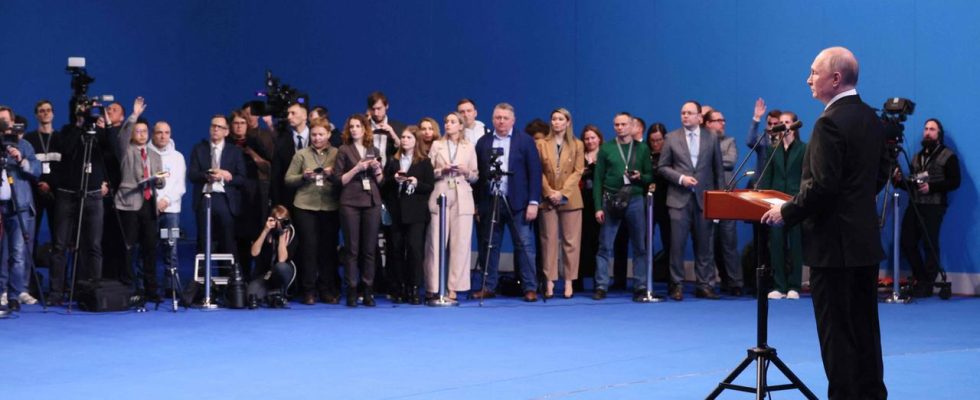interview
After the staged presidential election, Putin currently needs to fear neither the opposition nor competing elites, explains expert Sasse. This is also why he mentioned Kremlin critic Navalny by name for the first time.
tagesschau24: For the first time, Putin spoke the name of opposition figure Alexei Navalny, who died in captivity, in his victory speech after the staged presidential election. How remarkable do you find that?
Gwendolyn Sasse: It remains remarkable because he has never said it before and has only ever called it “the blogger”. But what this means above all is that he no longer sees any danger from Navalny.
The topic has actually been ticked off for him and he just said that it was sad, but that things like that happen. That’s not a big statement, but he still saw reason to react to Navalny, because there are also some pictures in Russia of people laying flowers at Navalny’s grave.
The most important statement, however, is that he can no longer imagine any danger from this network. In this respect, it actually only underlines that, from Putin’s point of view, there is no opposition at this point in time.
To person
Gwendolyn Sasse is the scientific director of the Center for Eastern European and International Studies (ZOIS) in Potsdam. The political scientist and Slavic scholar is also a professor of comparative politics at the University of Oxford and an external council member at the think tank Carnegie Europe.
“All the Social promise have to be paid”
tagesschau24: What do you think Putin’s goals are in his new term in office – apart from maintaining power and defeating Ukraine?
Sasse: Both are very important goals for him. And a lot will depend, and this is also clear to Putin, on how the war continues, and his own position is also linked to this. The preservation of Putin’s system and of course the country’s economy depend on the war.
He converted the Russian economy to a war economy. At the moment the numbers look reasonably good except for inflation. But it is questionable how long this can be maintained if the war continues for a very long time.
Before the election, he made many social promises in his State of the Union speech, which first have to be paid for. And: A war economy is to some extent contradictory to the social policy that he needs in order to maintain his approval ratings.
“No real political alternatives”
tagesschau24: Does that mean it’s not automatic at all that he continues to rule until the end of his life?
Sasse: It’s not automatic, but I don’t see any real political alternatives at the moment, including no elites that would replace him directly. I assume he will now serve a six-year term.
But in authoritarian systems there can also be twists and turns. This could have something to do with the war and of course also with his health, other issues also come into play – that a strong-looking authoritarian ruler suddenly loses power, steps aside or suddenly doesn’t exist anymore. But we are a long way from that point and I wouldn’t rule out the possibility that he will stand for election again in 2030.
“Suppress the appearance of an alternative”
tagesschau24: And do you think he will take even tougher action against his critics in the coming years?
Sasse: It’s hard to imagine that it could get any harder. If we consider that even the word war can result in long prison sentences. But yes, the repressive system will be maintained and will continue to grow where possible.
It’s about further suppressing any opposition, even the appearance of a possible political alternative. Because there is discontent in the country, both social discontent and some discontent with the war.
But it must be made clear that this is not the majority sentiment at the moment. But as soon as there is any political alternative on the horizon, this could crystallize – especially among elites, and we want to prevent that.
“A dynamic would have to be set in motion”
tagesschau24: And even though Putin is now 71 years old and won’t live forever or remain healthy, there are no successors coming forward? Isn’t there anything to see?
Sasse: At the moment there is really no sign that any names are clearly standing out, especially among the elite. This also shows that this is not the right time for this. You could probably put yourself in danger if you were to position yourself too clearly towards Putin now.
But a dynamic can get going and then perhaps names that are not obvious to us today will come to the fore. In particular, these could also be regional dynamics that may suddenly raise political elites from the province to another level. But right now we’re not really seeing these kinds of power plays or power struggles, at least not openly.
tagesschau24: Putin is considered to despise democracy. If that is the case, Ms. Sasse, then why is he still holding elections that at least visually resemble those of Western democracies?
Sasse: Many authoritarian systems hold elections, they have important functions for a system like the one in Russia. They mobilize society. The main aim was to show that – especially through voter turnout, even if the results were manipulated – it gives the impression that society can be mobilized and that it supports the system.
This is very important for the political space that Putin wants to take to legitimize his system. It’s about this staging of a lack of alternatives. And it succeeded.
The interview was conducted by Gerrit Derkowski for tagesschau24. The interview has been slightly adapted for the written version.

